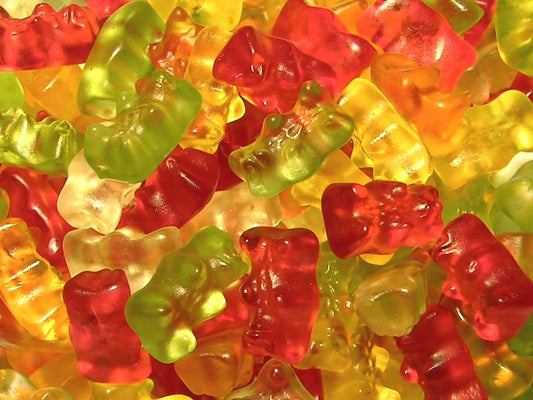Everyone knows Haribo gummy bears — and for a good reason. Gummy bears are a popular candy, and Haribo is one of its largest manufacturers globally. The confectioner boasts an annual production capacity that would wrap around the world ten times!
However, just because a brand is iconic doesn’t mean their product is right for your diet.
While companies like Chewwies are dedicated to producing sugar-free and 100% halal-certified gummies, the same can not be said of other confectioners.
This article will scrutinise Haribo gummy bears while answering the big question, Are Haribo gummy bears Halal? If you want to find out which other gummy brand is halal or not, we have already written about it on our blog.
Quick Answer: No, and Yes — only Haribo gummy bears made in Turkey are halal. Any Haribo gummy bear made from the UK, Germany, Austria, Spain, France, and all countries outside Turkey is not halal.
Haribo was the first company to create gummy candy in the form of dancing bears. The increasing demand for these soft, chewy, fruit-flavoured gummies soon made other companies join in its production. Because of this, Haribo had to name its gummy bears Goldbears to distinguish them from other manufacturers’ products.
According to the Seattle Times, Haribo produces 100 million gummy bears daily and distributes them to over 100 countries worldwide. They come in a variety of six fruit flavours and colours:
- Lemon flavoured Haribo Goldbears are yellow-coloured.
- Orange flavoured, orange colour.
- Pineapple flavoured Haribo Goldbears are colourless.
- Raspberry flavoured dark red colour.
- Strawberry flavoured, light red colour
- Apple flavoured, green colour.
In rare cases, Haribo has been known to produce halal-certified gummy bears. Although, you can always confirm by reading the ingredient label behind their packet.

Haribo Gummy Bears Ingredients
The main ingredients found in Haribo Gummy Bears, according to the company’s website, are:
Glucose Syrup
Glucose syrup has been the ideal go-to for edible manufacturers over the years. They give Haribo Goldbears that nice, soft, and chewy texture.
Conclusion: Glucose syrup is plant-based; gotten from potatoes, wheat, barley, rice, or cassava, and is halal.
Sugar
Sugar is the primary sweetener in Goldbears. Each serving of Haribo gummy bears (13 pieces) contain 14 grams of sugar. Though it is considered safe to eat, the American Heart Association recommends a daily intake of no more than 25 grams of sugar for women and 36 grams for men.
Conclusion: In the UK and most parts of Europe, the sugar in Haribo gummy bears is plant-based and Halal.
Citric Acid
Citric acid gives Haribo gummy bears their tartness.
Conclusion: Citric acid occurs naturally in citrus fruits and is halal.
White and Yellow Beeswax
Towards the end of production, Haribo sprays its gummy bears with a thin layer of white and yellow beeswax to give them a nice shine and prevent them from sticking together in the bag.
Conclusion: Beeswax is naturally produced by bees and is halal.
Carnauba Wax
Carnauba wax has the same use as beeswax. It is a glazing agent that gives Haribo gummy bears their shiny look.
Conclusion: Carnauba wax is naturally found in the fronds of carnauba palm and is halal.
Natural and Artificial Flavours
Haribo Goldbears have six fruit flavours: apple, strawberry, raspberry, orange, lemon, and pineapple. The exact details in these flavours are legally protected.
Conclusion: Haribo gummy bears contain natural and artificial flavours that are halal.
Artificial Colours
Haribo uses a combination of colour additives approved by the Food and Drug Administration: Yellow 5, Red 40, and Blue 1 to create the different colours in its gummy bears.
Conclusion: Artificial colours in Haribo gummy bears are halal.
Gelatin
Gelatin gives Haribo gummy bears their signature nice chewy texture.
Unfortunately, gelatine is a protein gotten from boiling the skin, bones, ligaments and tendons of animals—typically pigs.
Haribo confirms that their gummy bears contain pork gelatin and the only Goldbears that don't are produced in Turkey, where beef is the go-to gelling agent.
The gummy bears produced in all their other factories in the UK, Germany, Austria, Spain, France, or any country outside Turkey is not halal.

Conclusion
If the packaging on your Haribo Goldbears does not have “Made in Turkey” or “Product of Turkey”, it is haram and should not be eaten by a Muslim.
Alternatives to Haribo Gummy Bears
It can be challenging to find gummy bears without gelatin in them. Fortunately, a few companies like Chewwies use pectin instead of gelatin as their gelling agent.
Chewwies is a healthy, all-natural alternative to Haribo. Each pack is free from sugar, gelatine, alcohol, gluten, dairy, allergens, artificial colours, flavours and preservatives.
Flavours include:
All Chewwies products are suitable for vegans and are halal & kosher certified—the only way you can pamper your teeth and still have peace of mind :)
Click here for healthy gummies filled with dietary requirements suitable for all ages.



